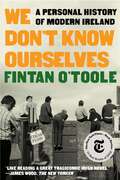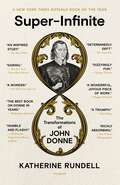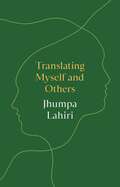Title search results
Showing 1 - 3 of 3 items

We Don't Know Ourselves: A Personal History of Modern Ireland
By Fintan O'Toole. 2021
Braille (Contracted), Electronic braille (Contracted), DAISY Audio (Direct to Player), DAISY Audio (Zip), DAISY text (Direct to player), DAISY text (Zip), Word (Zip), ePub (Zip)
Literature biography, Politics and government biography, European history, Politics and government
Synthetic audio, Automated braille
NEW YORK TIMES BESTSELLER NEW YORK TIMES • 10 BEST BOOKS OF THE YEAR NATIONAL BESTSELLER The Atlantic: 10 Best…
Books of 2022 Best Books of the Year: Washington Post, New Yorker, Salon, Foreign Affairs, New Statesman, Chicago Public Library, Vroman's “[L]ike reading a great tragicomic Irish novel.” —James Wood, The New Yorker “Masterful . . . astonishing.” —Cullen Murphy, The Atlantic "A landmark history . . . Leavened by the brilliance of O'Toole's insights and wit.” —Claire Messud, Harper’s Winner • 2021 An Post Irish Book Award — Nonfiction Book of the Year • from the judges: “The most remarkable Irish nonfiction book I’ve read in the last 10 years”; “[A] book for the ages.” A celebrated Irish writer’s magisterial, brilliantly insightful chronicle of the wrenching transformations that dragged his homeland into the modern world. Fintan O’Toole was born in the year the revolution began. It was 1958, and the Irish government—in despair, because all the young people were leaving—opened the country to foreign investment and popular culture. So began a decades-long, ongoing experiment with Irish national identity. In We Don’t Know Ourselves, O’Toole, one of the Anglophone world’s most consummate stylists, weaves his own experiences into Irish social, cultural, and economic change, showing how Ireland, in just one lifetime, has gone from a reactionary “backwater” to an almost totally open society—perhaps the most astonishing national transformation in modern history. Born to a working-class family in the Dublin suburbs, O’Toole served as an altar boy and attended a Christian Brothers school, much as his forebears did. He was enthralled by American Westerns suddenly appearing on Irish television, which were not that far from his own experience, given that Ireland’s main export was beef and it was still not unknown for herds of cattle to clatter down Dublin’s streets. Yet the Westerns were a sign of what was to come. O’Toole narrates the once unthinkable collapse of the all-powerful Catholic Church, brought down by scandal and by the activism of ordinary Irish, women in particular. He relates the horrific violence of the Troubles in Northern Ireland, which led most Irish to reject violent nationalism. In O’Toole’s telling, America became a lodestar, from John F. Kennedy’s 1963 visit, when the soon-to-be martyred American president was welcomed as a native son, to the emergence of the Irish technology sector in the late 1990s, driven by American corporations, which set Ireland on the path toward particular disaster during the 2008 financial crisis. A remarkably compassionate yet exacting observer, O’Toole in coruscating prose captures the peculiar Irish habit of “deliberate unknowing,” which allowed myths of national greatness to persist even as the foundations were crumbling. Forty years in the making, We Don’t Know Ourselves is a landmark work, a memoir and a national history that ultimately reveals how the two modes are entwined for all of us.
Super-Infinite: The Transformations of John Donne
By Katherine Rundell. 2022
Braille (Contracted), Electronic braille (Contracted), DAISY Audio (Direct to Player), DAISY Audio (Zip), DAISY text (Direct to player), DAISY text (Zip), Word (Zip), ePub (Zip)
Literature biography, Criticism
Synthetic audio, Automated braille
From standout scholar Katherine Rundell, Super-Infinite presents a sparkling and very modern biography of John Donne: the poet of love,…
sex, and death.Sometime religious outsider and social disaster, sometime celebrity preacher and establishment darling, John Donne was incapable of being just one thing.In his myriad lives he was a scholar of law, a sea adventurer, a priest, an MP - and perhaps the greatest love poet in the history of the English language. Along the way he converted from Catholicism to Protestantism, was imprisoned for marrying a sixteen-year old girl without her father’s consent; struggled to feed a family of ten children; and was often ill and in pain. He was a man who suffered from black surges of misery, yet expressed in his verse many breathtaking impressions of electric joy and love.
Translating Myself and Others
By Jhumpa Lahiri. 2022
Braille (Contracted), Electronic braille (Contracted), DAISY Audio (Direct to Player), DAISY Audio (Zip), DAISY text (Direct to player), DAISY text (Zip), Word (Zip), ePub (Zip)
Literature biography, Women biography, General non-fiction, Criticism
Synthetic audio, Automated braille
Luminous essays on translation and self-translation by the award-winning writer and literary translatorTranslating Myself and Others is a collection of…
candid and disarmingly personal essays by Pulitzer Prize–winning author Jhumpa Lahiri, who reflects on her emerging identity as a translator as well as a writer in two languages.With subtlety and emotional immediacy, Lahiri draws on Ovid’s myth of Echo and Narcissus to explore the distinction between writing and translating, and provides a close reading of passages from Aristotle’s Poetics to talk more broadly about writing, desire, and freedom. She traces the theme of translation in Antonio Gramsci’s Prison Notebooks and takes up the question of Italo Calvino’s popularity as a translated author. Lahiri considers the unique challenge of translating her own work from Italian to English, the question “Why Italian?,” and the singular pleasures of translating contemporary and ancient writers.Featuring essays originally written in Italian and published in English for the first time, as well as essays written in English, Translating Myself and Others brings together Lahiri’s most lyrical and eloquently observed meditations on the translator’s art as a sublime act of both linguistic and personal metamorphosis.